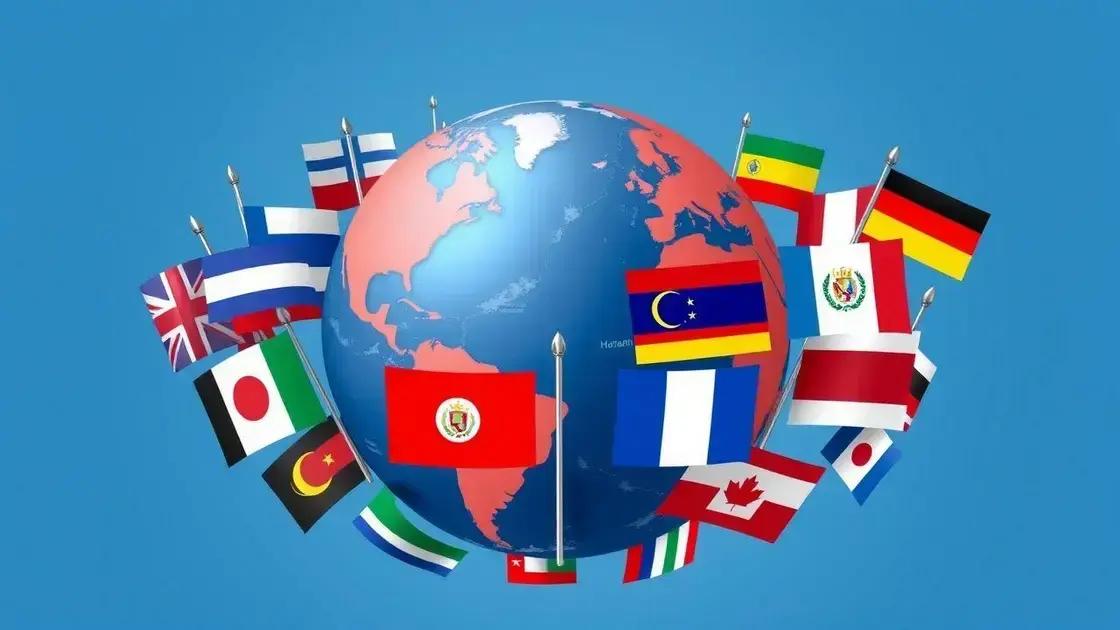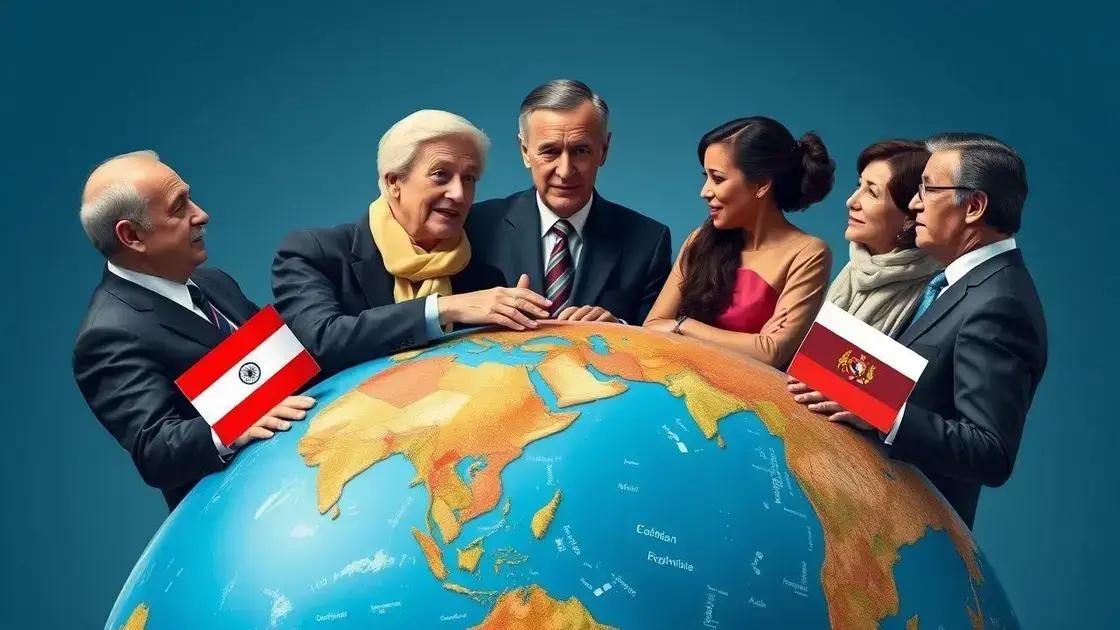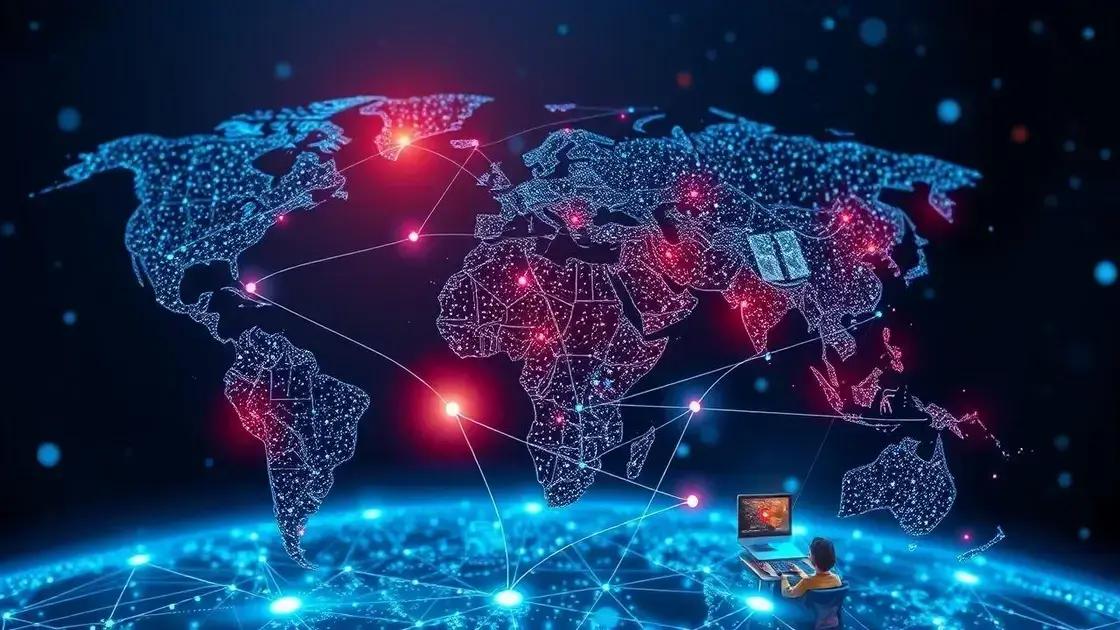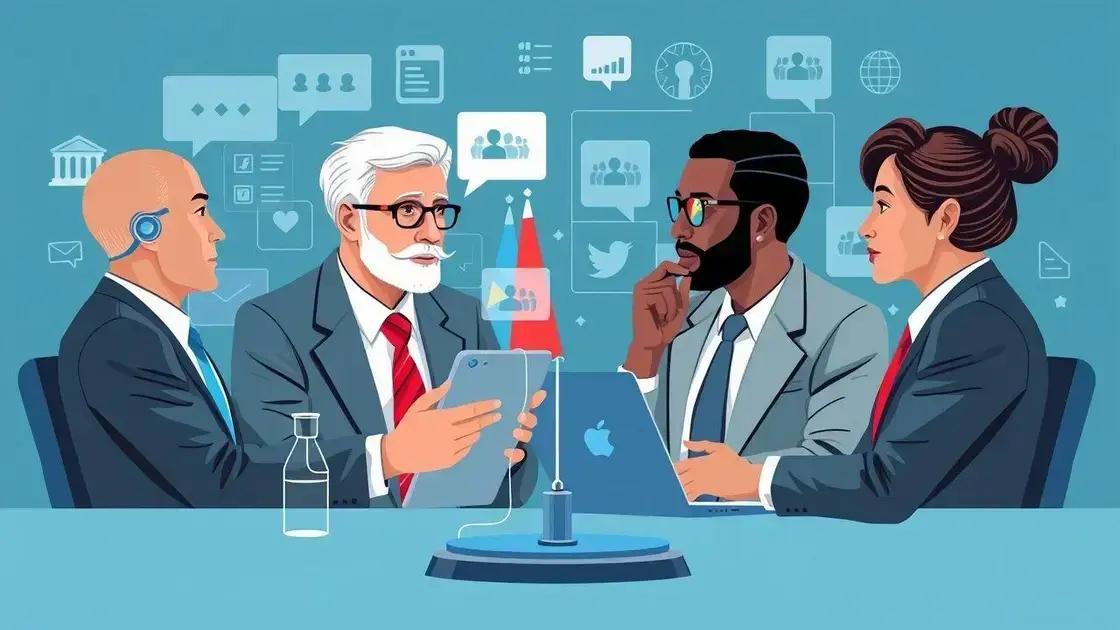International relations updates: the latest trends and insights

Anúncios
Emerging trends in international diplomacy include increased multilateralism, the rise of digital diplomacy, greater emphasis on human rights, and a heightened focus on addressing climate change collaboratively.
International relations updates matter now more than ever, as the world is constantly shifting. How do current events affect your daily life and the global stage? Let’s dive into the latest news and understand what’s at play.
Understanding the current global landscape
Understanding the current global landscape is essential for grasping the trends in international relations. As countries interact more, their relationships evolve, impacting global policies and economies.
Anúncios
Key Factors Influencing the Global Landscape
Several critical factors shape the dynamics of international relations today:
- Geopolitical tensions: Nations often compete for resources and influence, leading to conflicts.
- Economic partnerships: Trade agreements and economic alliances play a significant role in global stability.
- Technological advancements: Innovations impact everything from communication to defense strategies, changing how nations collaborate.
As these factors intertwine, they create a complex network of relationships among nations. For instance, trade wars can lead to strained diplomatic ties, while cooperative efforts on climate change can strengthen alliances.
Moreover, the rise of new powers on the global stage reshapes traditional alliances. Countries like China and India are becoming more influential, shifting the balance of power and prompting established nations to adapt their strategies. This challenge encourages both cooperation and rivalry, significantly affecting the political climate.
Anúncios
Impact of Global Events
Current events serve as immediate indicators of the changing landscape. Crises, such as conflicts or economic downturns, quickly draw responses from global leaders. The way leaders handle these situations can either escalate tensions or build bridges between nations.
In addition, public opinion and social movements are growing more influential in shaping foreign policy. Citizens now have access to information through the internet, making governments more accountable to their populace. This shift is significant as it encourages transparency and engagement in international matters.
As we move forward, understanding these elements will be crucial. By analyzing how nations respond to crises, how they engage in trade, and how public sentiment shapes policy, we can gain insight into the current global landscape.
Key players in international relations today

Key players in international relations today shape the world’s balance of power. Understanding who these players are helps us navigate global issues more effectively.
States as a Primary Player
Countries remain at the forefront of international relations. Major nations like the United States, China, and Russia influence diplomatic decisions and global strategies.
- United States: Often sets global standards through military and economic power.
- China: Continues to rise as a dominant force, impacting trade and environmental policies.
- Russia: Plays a crucial role in energy supplies and geopolitical conflicts.
Interactions among these countries determine outcomes affecting all nations, big and small. Smaller nations also play roles by forming alliances to protect their interests, especially in regional conflicts.
Non-State Actors
Non-state actors are increasingly relevant in the international arena. Organizations like the United Nations and the World Health Organization address global challenges beyond the scope of national governments.
- International Organizations: Promote peace and security, helping countries collaborate.
- NGOs: Advocate for human rights, environmental protection, and humanitarian aid.
- Multinational Corporations: Influence economies and policies through investments and trade.
These actors often work alongside countries to tackle global issues, showcasing the importance of cooperation in the modern world.
New social movements and public opinion are also key players. The rise of activism can pressure governments to change policies on climate, social justice, and human rights. Engaging the public through social media amplifies these movements and enables them to challenge traditional power structures.
The Role of Technology in International Relations
Technology has transformed international relations. Communication is now instantaneous, allowing leaders to respond quickly to global events. Cyber security has also become a critical area, as nations protect their information and infrastructure.
In this interconnected world, the actions of a single player can have ripple effects that touch regions far and wide. Monitoring these key players helps us understand and predict how interactions may unfold in the future.
Impact of economic factors on diplomacy
The impact of economic factors on diplomacy cannot be overstated. Economic stability, trade relationships, and financial aid influence how countries interact with one another on the global stage.
Economic Stability and Diplomatic Relations
A nation’s economic health is a key indicator of its power. Countries with strong economies often wield more influence in international negotiations. They have the resources to project power, whether through military spending or foreign aid.
- Strong economies: These countries can negotiate favorable trade agreements and lead global initiatives.
- Economic downturns: Financial crises can weaken a country’s bargaining position and lead to isolationist policies.
- Debt and dependence: Nations reliant on loans can find their sovereignty compromised by external demands.
In this way, economic conditions directly shape diplomatic strategies, influencing alliances and rivalries.
Trade Relationships
Trade is one of the most significant aspects of international relations. Countries often form alliances based on mutual economic interests, leading to cooperative agreements.
When nations engage in trade, they open channels for dialogue and build trust. For instance, countries that export and import goods and services promote interdependence, making conflicts less likely. However, trade disputes can also lead to tensions, as seen in recent tariff battles.
Foreign Aid and Development
Foreign aid plays a crucial role in diplomacy. Nations that provide aid can increase their influence, especially in developing regions. This aid can be in the form of financial support, humanitarian assistance, or investment in infrastructure.
- Strategic partnerships: By offering aid, countries can secure alliances and access to resources.
- Conditional aid: Assistance is often tied to specific policies or political reforms, impacting the recipient nation’s sovereignty.
- Soft power: Nations like the U.S. and European countries use aid to enhance their global image and influence.
However, reliance on aid can create dependency, complicating diplomatic relations.
Overall, understanding the economic context is essential in diplomatic discussions. The interplay between economics and diplomacy shapes alliances and confrontations, influencing global peace and stability.
Role of technology in shaping relations

The role of technology in shaping relations is significant in today’s interconnected world. Technology influences communication, trade, and even diplomacy, creating a landscape that evolves rapidly.
Enhanced Communication
With the rise of digital communication tools, countries can interact instantly. Emails, video calls, and social media platforms facilitate real-time conversations, which help leaders stay connected. This constant connectivity can improve cooperation and prevent misunderstandings.
- Social media: Platforms allow citizens to voice their opinions and pressure governments to take action on foreign policy.
- Video conferencing: Leaders can meet virtually, saving time and resources.
- Instant news dissemination: Rapid sharing of information can prompt swift responses to global events.
These technological advancements empower nations to engage more effectively, but they can also introduce challenges.
Economic Impact of Technology
Technology greatly affects global trade relationships. E-commerce has transformed how countries do business, allowing goods and services to be exchanged across borders with ease. For example, companies can now reach international markets directly through online platforms, bypassing traditional trade barriers.
However, technology also creates competition. Countries that innovate can gain a substantial advantage, while those that lag behind may struggle economically. This disparity can lead to tensions between nations, as competition for technological supremacy grows.
Cybersecurity and Diplomacy
As technology evolves, so do the threats associated with it. Cybersecurity has become a critical issue in international relations. Nations must protect their data and infrastructure from cyberattacks, which can escalate into diplomatic conflicts.
- International agreements: Countries are negotiating treaties to address cybersecurity threats collaboratively.
- Cyber warfare: Nations must navigate conflicts in the digital realm, impacting diplomatic relations.
- Information warfare: Misinformation can influence public perception and policy decisions, affecting international relations.
Maintaining strong cybersecurity is crucial for ensuring stable diplomatic relations in this technology-driven era.
In summary, the influence of technology on international relations is profound. By shaping communication, impacting trade, and introducing new challenges, technology plays a vital role in how countries interact today.
Emerging challenges in global politics
Emerging challenges in global politics are reshaping how nations interact. As the world evolves, new issues arise that require attention from leaders. These challenges can have far-reaching consequences on international relations.
Climate Change
The impact of climate change cannot be ignored. It threatens resources and forces countries to collaborate on solutions. Natural disasters, rising sea levels, and changing weather patterns create urgent needs for action.
- Resource scarcity: Countries may compete for water and energy, leading to tension.
- Migration: People are displaced due to environmental changes, straining host nations.
- International agreements: Nations must negotiate treaties to address climate action collectively.
These factors make climate change a central issue in global politics.
Geopolitical Tensions
Geopolitical tensions are rising, especially in regions with historical conflicts. Borders are often contentious, and disputes over territories can escalate quickly. The relationships between superpowers also impact global stability, with rivalries influencing diplomacy.
- Territorial disputes: Conflicts in areas like the South China Sea highlight competing interests.
- Nuclear proliferation: The risk of countries developing nuclear weapons raises global security concerns.
- Trade wars: Economic battles can lead to strained relations and affect global markets.
These tensions create complex challenges that require careful management to avoid escalation.
Technological Disruptions
Technology brings both opportunities and challenges. Cybersecurity threats and misinformation can destabilize governments and sow discord among nations. The digital landscape has become a battleground where ideas and information are contested.
- Cyber attacks: Nations face threats to their infrastructure and security.
- Misinformation campaigns: False information can manipulate public perception and impact elections.
- Data privacy: Nations must balance security with individual rights.
Managing these challenges requires international cooperation and innovative solutions. As technology continues to evolve, so do the complexities of global politics.
Understanding these emerging challenges is vital for fostering peace and cooperation among nations. Addressing these issues head-on can help build a more stable and secure world.
Future trends in international diplomacy

Future trends in international diplomacy are evolving rapidly. As global challenges increase, the way nations interact is changing significantly. Understanding these trends is essential for effective engagement in international relations.
Greater Emphasis on Multilateralism
Nations are recognizing that many issues, like climate change and health crises, require collective action. Multilateral agreements are becoming more important as countries work together to solve shared problems. This shift fosters cooperation and helps build trust among nations.
- International coalitions: Countries are forming alliances to address issues that affect multiple states.
- Global governance: Strengthening organizations like the United Nations supports diplomatic efforts.
- Shared resources: Collaborative management of resources ensures sustainability and security.
This trend indicates a move away from unilateral approaches and towards cooperative diplomacy.
Digital Diplomacy
As technology advances, digital diplomacy is becoming more prominent. Governments are using social media and online platforms to engage with citizens and other countries. This direct communication allows for faster responses and more transparency in diplomatic efforts.
- Public diplomacy: Countries are utilizing social media to share their perspectives with global audiences.
- Cyber diplomacy: Nations are negotiating rules to govern behavior in cyberspace.
- Online forums: Virtual events facilitate discussions on international issues and foster collaboration.
Digital tools enhance engagement and provide new avenues for diplomacy.
Focus on Human Rights
Human rights issues are gaining more attention in international relations. Countries are increasingly holding each other accountable for human rights violations. This trend influences diplomatic strategies, often shaping negotiations and partnerships.
- Conditional aid: Nations may attach human rights conditions to foreign aid and support.
- Advocacy coalitions: NGOs and advocacy groups play a significant role in highlighting cases of abuse.
- Sanctions: Countries may impose sanctions on those who violate human rights, affecting diplomatic relations.
As human rights become central to diplomacy, nations must navigate these complex issues carefully.
Overall, the landscape of international diplomacy is set to change dramatically. By staying informed about these trends, countries can adapt their strategies to build stronger international relationships.
In conclusion, the landscape of international diplomacy is evolving rapidly. As we face new challenges like climate change, technological advancements, and the rising importance of human rights, nations must adapt their strategies to stay effective. The future will see increased collaboration through multilateralism, where countries work together more closely. Digital tools will enhance communication and engagement, while human rights issues will shape diplomatic discussions. By understanding these trends, nations can foster stronger relationships and build a more cooperative international community.
FAQ – Frequently Asked Questions about Future Trends in International Diplomacy
What is multilateralism in international diplomacy?
Multilateralism refers to countries working together in groups to address global issues, promoting cooperation over unilateral actions.
How does digital diplomacy enhance communication?
Digital diplomacy uses online platforms and social media to facilitate faster communication and engage directly with global audiences.
Why is there a greater focus on human rights in diplomacy?
Human rights are increasingly seen as central to international relations, influencing partnerships and diplomatic negotiations.
What challenges does climate change present to diplomacy?
Climate change creates resource scarcity and requires global collaboration, impacting diplomatic relations and negotiations among nations.







